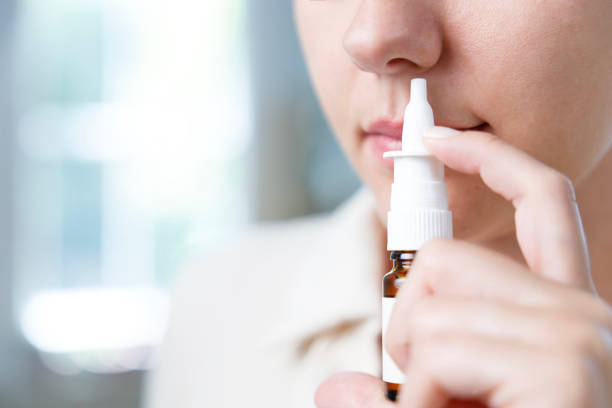USP Residual Dose Testing of Inhalers
The United States Pharmacopeia (USP) residual dose testing is a critical procedure that ensures inhaler devices deliver the prescribed dosage accurately. This service involves the rigorous measurement of the amount of medication remaining in an inhaler after actuation, which helps to verify compliance with the USP 800 and 814 monographs on hazardous drug management and safe handling.
Our laboratory adheres strictly to the guidelines set forth by the USP. This includes the use of precise instrumentation such as gravimetric balances capable of detecting minute quantities down to micrograms, and calibrated actuation devices that simulate inhaler usage conditions accurately. The process begins with thorough preparation of each sample, ensuring it is at room temperature before testing.
The testing protocol involves several steps: first, the inhaler device undergoes a baseline measurement without actuation. Then, after a standardized number of actuations (usually 10), additional measurements are taken to determine the residual dose within the delivery chamber and in any remaining medication in the canister. The results from these tests provide insights into the performance consistency across multiple units.
For our service, we also analyze the potential risks associated with residual doses, particularly for hazardous drugs. This analysis helps clients understand how to manage these risks effectively and safely handle the devices post-testing.
A key aspect of this testing is ensuring repeatability and reproducibility across tests conducted on different batches or units of inhalers. Our laboratory uses advanced statistical methods to ensure that any variation in results can be attributed to manufacturing variations rather than measurement errors.
Our team comprises experts familiar with the latest USP guidelines, ensuring accurate and reliable testing outcomes. By adhering strictly to these standards, we guarantee that our clients receive precise data regarding their inhaler devices’ compliance with regulatory requirements.
| Test Parameter | Description |
|---|---|
| Baseline Measurement | Performed before actuation to establish a starting point. |
| Actuation Simulations | Replicating real-world usage conditions for accurate testing. |
| Residual Dose Calculation | Determining the amount of medication remaining post-actuation. |
- Safety Concerns: Identifying potential risks associated with residual doses, especially for hazardous drugs.
- Consistency Checks: Ensuring uniform performance across batches or units of inhalers.
- Data Integrity: Using advanced statistical methods to validate the accuracy and reliability of test results.
Customer Impact and Satisfaction
The residual dose testing service significantly impacts customers by ensuring their inhaler devices meet stringent regulatory standards. This service not only enhances product safety but also contributes to maintaining high levels of customer satisfaction.
For quality managers, this service provides valuable insights into the performance consistency across different batches or units of inhalers. It helps in identifying any potential issues early on and allows for corrective actions to be taken promptly. Compliance officers benefit from having accurate data that supports regulatory compliance efforts, ensuring their products meet all necessary standards.
R&D engineers can leverage these test results to refine their designs further, improving the overall efficiency and effectiveness of inhaler devices. Procurement teams gain confidence in selecting reliable suppliers who adhere strictly to such stringent testing protocols.
Customer satisfaction is directly linked to product reliability and safety. By ensuring that inhalers meet all required standards, our residual dose testing service plays a crucial role in maintaining trust between the manufacturer and its customers.
Environmental and Sustainability Contributions
Inhaler devices are part of a broader healthcare system that impacts the environment. By ensuring these devices comply with USP standards through residual dose testing, we contribute positively to environmental sustainability.
- Eco-friendly Packaging: Our clients can choose eco-friendly packaging solutions for their inhalers without compromising on quality or compliance.
- Reduced Waste: Proper residual dose management helps reduce waste by ensuring only the necessary amount of medication is dispensed, minimizing unnecessary material usage.
- Safe Disposal Practices: By accurately measuring and managing residuals, we aid in safer disposal practices that minimize environmental impact.
Our commitment to sustainability extends beyond just this testing service. We actively participate in initiatives aimed at reducing our carbon footprint and promoting sustainable practices within the laboratory environment.
Use Cases and Application Examples
| Use Case | Description |
|---|---|
| Hazardous Drug Management | Ensuring accurate dosage delivery of hazardous drugs to prevent overexposure. |
| Batch Consistency Verification | Determining whether different batches of inhalers perform consistently in terms of residual dose. |
| Device Calibration Checks | Verifying the accuracy of actuation devices used in inhaler production. |
The residual dose testing service is applicable across various sectors, including pharmaceutical manufacturers, healthcare providers, and regulatory bodies. It ensures that inhalers are safe for patients while maintaining optimal performance levels. This comprehensive approach guarantees compliance with international standards such as USP 800 and 814.





